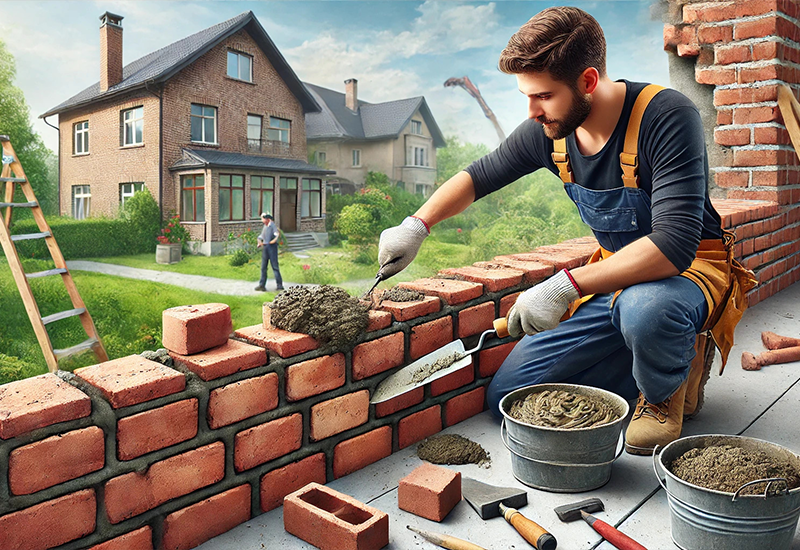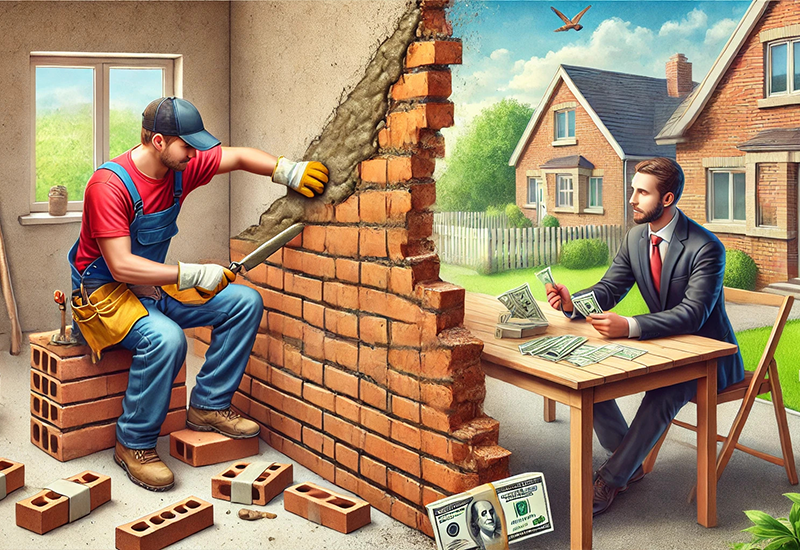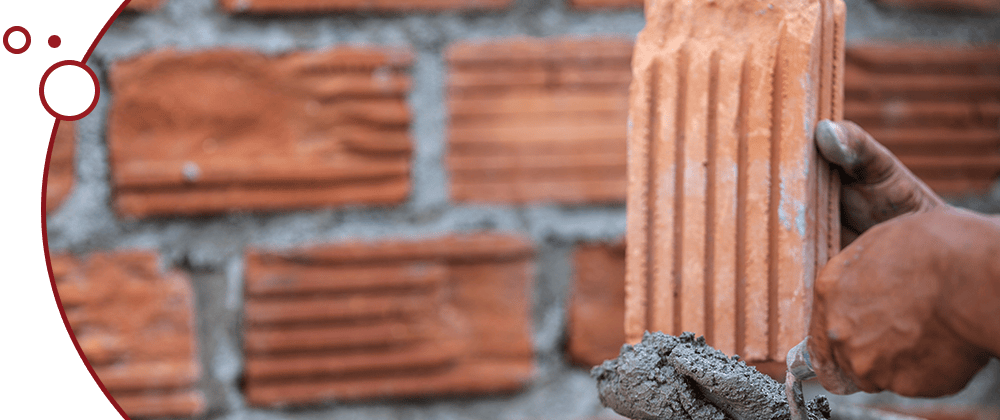
Brick walls are a classic and durable choice for many buildings, offering both aesthetic appeal and structural integrity. However, over time, they may require repairs due to weathering, structural shifts, or other factors. Understanding the cost associated with brick wall repair is crucial for homeowners and property managers alike. In this guide, we will explore the various factors that influence brick wall repair costs and provide practical tips to manage these expenses.
Table of Contents
What Influences Brick Wall Repair Cost?
The cost of repairing a brick wall can vary significantly based on several factors. Let’s delve into the key elements that impact the overall expense.
1. Extent of Damage
The severity of the damage to your brick wall is a primary factor. Minor cracks and chips will cost less to repair compared to extensive structural damage.
a) Minor Damage:
- Small cracks and chips in the brickwork are usually the least expensive to repair. These types of damages are often superficial and do not affect the wall’s structural integrity. Repairing minor cracks typically involves filling them with mortar or another sealant. This process is straightforward and can often be completed quickly by a professional mason.
Cost Estimate: For minor damage, the cost can range from $200 to $500, depending on the number of cracks and the size of the area affected.
b) Moderate Damage:
- When damage is more extensive but still not structurally compromising, such as larger cracks, missing mortar, or a few broken bricks, the repair process becomes more involved. Moderate damage may require repointing, which involves replacing the old mortar with new mortar. This helps to restore the wall’s appearance and prevent further water infiltration.
Cost Estimate: For moderate damage, costs can range from $500 to $1,500. This includes the labor and materials needed for repointing and replacing any damaged bricks.
c) Severe Damage:
- Extensive damage that affects the structural integrity of the wall requires comprehensive repairs. This might include replacing entire sections of the wall, addressing foundational issues, or reinforcing the wall to ensure stability. Severe damage repairs are the most costly due to the complexity and labor intensity involved.
Cost Estimate: For severe damage, repair costs can start from $2,000 and go up to $10,000 or more, depending on the extent of the damage and the required repair methods.
2. Type of Repair Needed
Different types of repairs have varying costs:
- Repointing:
- This involves replacing the mortar between bricks. It’s a common repair for aging walls. Over time, mortar can degrade due to weather exposure, leading to cracks and gaps that need filling. Repointing helps restore the wall’s integrity and appearance by carefully removing the old mortar and applying new mortar in its place.
Re-pointing Cost Estimate: Repointing typically costs between $5 and $25 per square foot, depending on the wall’s condition and the skill required to match the existing mortar.
- Tuckpointing:
- A more detailed process that involves matching the color of the mortar to the bricks. Tuckpointing not only repairs the mortar joints but also improves the wall’s aesthetic by using two different colors of mortar to create a more refined look.
Tuckpointing Cost Estimate: Tuckpointing is more labor-intensive and thus more expensive, with costs ranging from $10 to $30 per square foot.
- Brick Replacement:
- Necessary when bricks are severely damaged or missing. Replacing bricks involves removing the damaged brick, preparing the space, and installing a new brick that matches the existing wall.
Brick Replacement Cost Estimate: Replacing individual bricks can cost between $20 and $50 per brick, including labor. Larger sections that need multiple bricks replaced can significantly increase the cost.
- Structural Repairs:
- Major repairs that involve fixing foundational or load-bearing issues. Structural repairs are critical for the safety and stability of the building. These repairs can involve underpinning, installing wall anchors, or rebuilding entire sections of the wall.
Cost Estimate: Structural repairs are the most expensive, with costs ranging from $1,000 to $10,000 or more, depending on the severity of the damage and the complexity of the repair.
3. Labor Costs
Labor costs can vary based on your location and the complexity of the job. Hiring a skilled mason will ensure quality work but may come at a higher price.
a) Skilled Labor:
- Hiring a skilled mason ensures that the repair work is done correctly and efficiently. Experienced masons have the knowledge and tools to handle various types of brick repairs, from minor repointing to major structural fixes. However, their expertise comes at a premium.
Cost Estimate: Skilled masons typically charge between $50 and $100 per hour. For larger projects, they may offer a flat rate based on the scope of work.
b) Unskilled Labor:
- While unskilled laborers can assist with some aspects of brick wall repair, such as mixing mortar or cleaning up the worksite, they are not suited for detailed or complex repair tasks. Using unskilled labor can reduce costs but may result in lower-quality repairs.
Cost Estimate: Unskilled labor rates range from $20 to $40 per hour.
4. Materials Used
The type and quality of materials used can also affect the cost. High-quality bricks and mortar may be more expensive but will provide better durability.
a) Brick Quality:
- High-quality bricks are more durable and can withstand weathering and wear better than cheaper options. Investing in good-quality bricks can save money in the long run by reducing the frequency of repairs.
Cost Estimate: High-quality bricks can cost between $0.50 and $3 per brick, depending on the type and finish.
b) Mortar Quality:
- Using high-quality mortar ensures that the joints between bricks remain strong and weather-resistant. Mortar with additives that enhance durability and flexibility can be more expensive but is worth the investment for long-lasting repairs.
Cost Estimate: Premium mortar can cost between $5 and $10 per bag, which covers approximately 20 square feet of repointing work.
5. Accessibility of the Wall
Walls that are difficult to access, such as those at great heights or in tight spaces, may require special equipment and additional labor, increasing the overall cost.
a) Height and Location:
- Repairing brick walls on multi-story buildings or in hard-to-reach places requires scaffolding, lifts, or other specialized equipment. This adds to the labor time and cost, as setting up and taking down such equipment is time-consuming.
Cost Estimate: For difficult-to-access areas, additional costs for equipment rental and setup can range from $500 to $2,000, depending on the height and complexity of the access.
b) Tight Spaces:
- Brick walls in confined areas may require more time and effort to repair due to limited maneuverability. Workers may need to use smaller tools and work more slowly to avoid damaging surrounding structures.
Cost Estimate: Working in tight spaces can add $200 to $500 to the overall repair cost.
Estimating Brick Wall Repair Costs
To give you a clearer picture, let’s break down the average costs associated with different types of brick wall repairs.
Repointing Costs
Repointing is a common repair method for brick walls. The cost typically ranges from $5 to $25 per square foot, depending on the complexity and extent of the work.
| Repair Type | Cost per Square Foot |
| Minor Repointing | $5 – $10 |
| Extensive Repointing | $15 – $25 |
Explanation:
- Minor Repointing: This is usually needed for small areas with minimal damage. The process involves removing and replacing the old mortar in the joints. It’s relatively straightforward and less time-consuming, which keeps costs on the lower end.
- Extensive Repointing: Required for larger areas or walls with significant damage. This process is more labor-intensive and takes more time, hence the higher cost. It ensures the stability and appearance of the wall are restored effectively.
Brick Replacement Costs
Replacing individual bricks is necessary when they are cracked or broken. On average, the cost per brick can range from $20 to $50, including labor.
| Repair Type | Cost per Brick |
| Single Brick Replacement | $20 – $30 |
| Multiple Brick Replacement | $35 – $50 |
Explanation:
- Single Brick Replacement: This involves replacing one or a few bricks. It’s relatively simple and doesn’t take much time, which is why it’s cheaper.
- Multiple Brick Replacement: If a larger section of the wall has damaged bricks, replacing them will be more complex and time-consuming, thus more expensive. This ensures the integrity and look of the wall are maintained.
Structural Repair Costs
Structural repairs are the most expensive type of brick wall repair. These costs can range from $1,000 to $10,000 or more, depending on the severity of the damage.
| Repair Type | Estimated Cost |
| Minor Structural Repairs | $1,000 – $3,000 |
| Major Structural Repairs | $5,000 – $10,000+ |
Explanation:
- Minor Structural Repairs: These are needed when there’s slight damage to the structural integrity of the wall, like small foundational cracks. These repairs are essential to prevent further damage and ensure the wall’s stability.
- Major Structural Repairs: Extensive damage that compromises the wall’s foundation or load-bearing capacity falls under this category. These repairs are complex and often require rebuilding parts of the wall or reinforcing the foundation, hence the high cost.
Cost-Saving Tips for Brick Wall Repair

Repairing a brick wall doesn’t have to break the bank. Here are some tips to help you save money on your brick wall repairs:
1. Regular Maintenance
Regular maintenance can prevent minor issues from becoming major problems. Inspect your brick walls periodically and address small cracks and mortar deterioration early.
- Inspect Frequently: Regularly checking your brick walls can help you spot small issues before they turn into big problems. Look for cracks in the mortar, crumbling bricks, or signs of water damage. These early signs can indicate that repairs are needed.
- Address Early: When you notice minor damage, address it promptly. Small cracks in the mortar can be filled with fresh mortar to prevent water from entering and causing more significant damage. This approach is much cheaper and less time-consuming than waiting for the damage to worsen.
2. DIY Minor Repairs
If you’re handy, consider doing minor repairs yourself. Repointing small sections of a wall or replacing a few bricks can be manageable DIY projects with the right tools and instructions.
- Repointing: Repointing involves removing the old, damaged mortar and replacing it with new mortar. For small sections, this can be a DIY project. You’ll need a few basic tools like a chisel, hammer, trowel, and a pointing tool. There are plenty of online tutorials that can guide you through the process.
- Brick Replacement: If a few bricks are damaged, you can replace them yourself. Carefully remove the damaged brick with a chisel and hammer, clean the space, and insert a new brick with fresh mortar. Ensure the new brick matches the existing ones for a seamless look.
3. Get Multiple Quotes
Always get quotes from several contractors before deciding. This allows you to compare prices and choose the best option for your budget.
- Shop Around: Don’t settle for the first quote you receive. Contact several local masons or brick repair companies and ask for detailed quotes. Compare the costs and the scope of work included in each quote.
- Ask Questions: When you receive quotes, don’t hesitate to ask questions. Make sure you understand what each quote includes, such as materials, labor, and any additional fees. This can help you make an informed decision and avoid unexpected costs.
4. Use Quality Materials
While it might be tempting to opt for cheaper materials, investing in high-quality bricks and mortar will save you money in the long run by reducing the need for future repairs.
- Durable Materials: High-quality bricks and mortar are more durable and less likely to crack or deteriorate over time. This means fewer repairs in the future and a longer lifespan for your brick wall.
- Cost vs. Longevity: Although high-quality materials may cost more initially, they offer better value over time. Investing in good materials reduces the frequency of repairs, ultimately saving you money and ensuring the stability of your wall.
Conclusion
Taking care of your brick walls doesn’t have to be overwhelming. By understanding brick wall repair cost and implementing regular maintenance, you can avoid costly repairs down the line. Remember to get multiple quotes and use quality materials to ensure the longevity of your repairs. If you’re looking for a professional contractor for brick wall repair, contact +(1) 917-477-9667 for expert assistance. Making informed decisions now will save you time, money, and stress in the future.
FAQs
Q: What is the average brick wall repair cost?
A: The average brick wall repair cost can vary widely, but minor repairs typically range from $5 to $50 per square foot. Major structural repairs can cost several thousand dollars, depending on the extent of the damage.
Q: How can I reduce brick wall repair cost?
A: To reduce brick wall repair cost, perform regular maintenance to catch issues early, consider DIY minor repairs, get multiple quotes from contractors, and use high-quality materials to prevent frequent repairs.
Q: What factors influence brick wall repair cost?
A: Several factors influence brick wall repair cost, including the extent of damage, type of repair needed, labor costs, materials used, and accessibility of the wall. Understanding these factors can help you budget effectively.
Q: Is repointing included in brick wall repair cost?
A: Yes, repointing is often included in brick wall repair cost. It involves replacing the mortar between bricks and can cost between $5 and $25 per square foot, depending on the complexity of the job.
Q: When should I consider professional help for my brick wall?
A: You should consider professional help for brick wall repair cost when the damage is extensive or structural. Professional contractors have the expertise to handle complex repairs and ensure the integrity of your wall. For professional assistance, contact +(1) 917-477-9667.


